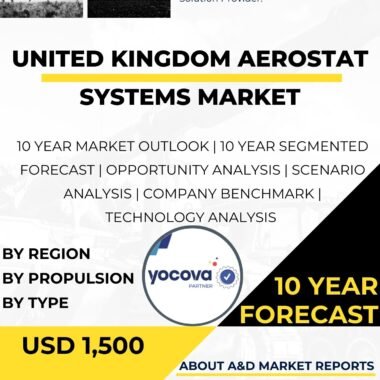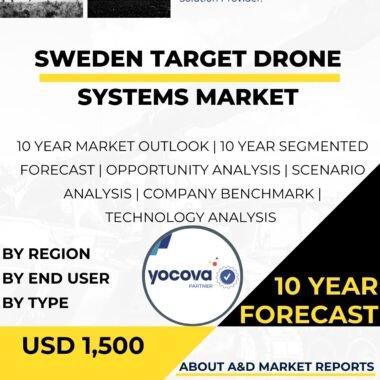Description
UK Target Drone Systems Market: Strengthening Defence Training
The United Kingdom Target Drone plays a vital role in enhancing the nation’s defense training and operational readiness. Target drones are unmanned aircraft designed to simulate enemy threats, providing realistic training scenarios for military personnel. These systems allow armed forces to practice air-defense tactics, radar tracking, and missile engagement safely and cost-effectively. By replicating real-world threats, target drones help personnel gain hands-on experience without exposing them to unnecessary risks. Consequently, these systems are a critical component of the UK’s broader strategy to maintain combat readiness and evaluate new defense technologies effectively.
Growth of the UK Target Drone Systems Market
The UK target drone market continues to grow due to strong investment from both government agencies and private defense contractors. Stakeholders focus on acquiring and developing modern drone platforms that meet evolving mission requirements. These investments aim to increase flight endurance, improve control systems, and expand simulation capabilities. As security challenges evolve, the demand for versatile and reliable target drones grows steadily. By continuously modernizing the drone fleet, the UK ensures that its training programs remain relevant, effective, and capable of preparing forces for a wide range of operational scenarios.
Defence Applications of Target Drone Systems
Target drones support a wide variety of defense applications. They are used to train air-defense personnel to identify and engage fast-moving threats accurately. They also test the performance of weapon systems, including missiles and radar, under realistic conditions. Additionally, drones allow the military to practice high-risk combat exercises safely. By providing precise data on performance and engagement, these systems help refine operational strategies and improve readiness. As a result, target drones enhance the UK’s ability to respond to real-world threats with confidence and efficiency.
Technology Innovation in the UK Target Drone Systems Market
Technological innovation drives the growth of the UK target drone market. Modern drones feature advanced autonomy, improved flight control, and realistic sensor simulation. Some are equipped with electronic warfare capabilities to replicate enemy tactics. These technological upgrades allow trainers to simulate multiple threat types, offering high-fidelity training experiences. Furthermore, developers are exploring AI-assisted flight management and advanced telemetry systems. By integrating these innovations, target drones provide increasingly realistic training environments that strengthen the skills of UK defense personnel.
Importance of Cost-Effective Training Solutions
Target drones offer a safe and affordable alternative to using manned aircraft for training exercises. They reduce operational costs while minimizing risks to personnel. Drones can support missile-defense drills, anti-air exercises, radar testing, and other complex scenarios without the need for expensive platforms. This cost-effectiveness allows the UK to conduct large-scale and frequent training programs, ensuring continuous preparedness. Additionally, target drones provide flexibility, enabling exercises to be adapted quickly to simulate emerging threats or new operational scenarios.
Versatility and Adaptability of Target Drones
The UK target drone systems market includes a diverse range of platforms, such as fixed-wing drones, rotary-wing drones, and expendable systems. Each type offers unique advantages for specific training missions. Fixed-wing drones provide long-range flight and endurance, while rotary-wing platforms offer maneuverability for tactical scenarios. Expendable drones allow realistic simulation of high-risk threats without the need for recovery. This variety ensures that training exercises can closely match real operational environments, enhancing the effectiveness of air-defense preparation and force readiness.
Continuous Innovation Driving Market Progress
Innovation remains a key driver of the UK target drone market. Manufacturers are improving flight performance, simulation accuracy, and autonomous capabilities. Developers are also exploring new applications, such as electronic-warfare simulations and swarm operations. These advancements allow trainers to design complex exercises that replicate modern combat scenarios. Continuous technological development ensures that target drones remain effective tools for both current and future defense training needs, keeping the UK armed forces prepared for evolving threats.
Need for Skilled Personnel in Target Drone Operations
Operating target drones requires trained specialists who understand flight systems, scenario design, and safety protocols. Drone operators, flight controllers, and exercise designers coordinate to create realistic training environments. Skilled personnel ensure that drones operate safely, efficiently, and in compliance with airspace regulations. Their expertise also allows for detailed performance analysis, helping instructors and commanders evaluate the effectiveness of training exercises. By investing in personnel, the UK maximizes the operational value of its target drone programs.
Strategic Planning for Drone Deployment
Deploying target drones requires careful planning and alignment with overall defense strategies. The UK must select appropriate drone types for specific training missions and operational goals. Strategic deployment ensures that training exercises are realistic, cost-effective, and aligned with emerging threats. In addition, careful planning enhances coordination between training teams, instructors, and operational units. By integrating drones into a structured training program, the UK can optimize both resource use and mission readiness.
Challenges in the UK Target Drone Systems Market
The market faces several challenges that must be addressed to ensure effectiveness. Sustained investment in research and development is essential to keep drones aligned with evolving threats. Training exercises generate large amounts of data, requiring robust analytics tools to assess performance and improve outcomes. Safety and compliance with aviation regulations remain critical to prevent accidents and ensure environmental responsibility. Addressing these challenges allows the UK to maintain safe, effective, and realistic target drone training programs.
Conclusion
The UK target drone systems market is essential to defense training and operational readiness. These systems provide realistic, safe, and cost-effective solutions for preparing forces against modern threats. Target drones support weapon testing, radar evaluation, and complex air-defense exercises. Continuous innovation, strategic investment, and skilled personnel ensure that the UK remains at the forefront of military training technology. Ultimately, these systems strengthen the armed forces’ preparedness, enhance combat skills, and contribute to national security in the years ahead.




